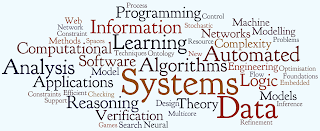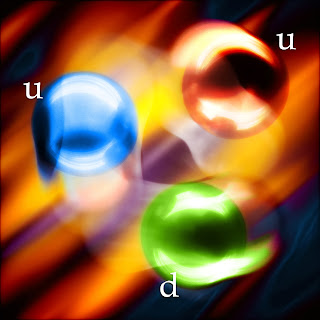Wednesday, 13 November 2013
Computer Science
Computer Science is the scientific and practical approach to the computation and its applications. It is the systematic study of the feasibility, structure, expression and mechanization of the methodological processes(also called algorithms) that underlie the acquisition, representation, processing, storage, communication of and access to information, whether such information is encoded in bits and bytes in a computer memory. A computer scientist is specializes in theory of computation and the design of computational systems.
Computer science deals with the theoretical foundations of information and computation, together with practical techniques for the implementation and application of these foundations.
Computer science is the science of how to treat information. There are many different areas in computer science. Some of the areas consider problems in a more abstract way. Some areas need special machines, called computers. A person who works with computers will often need mathematics, science, and logic in order to make and use computers.
Common tasks for a computer scientist
Asking questions
This is so that they can find new and easier ways to do things, and the way to approach problems with this information.Asking the right question
Computers can do some things easily (for example: simple math, or sorting out a list of names from A-to-Z). Computers cannot do some things, though. Computers cannot answer questions when there is not enough information, or when there is no real answer. Also, computers may take too much time to finish long tasks. For example, it may take too long to find the shortest way through all of the towns in the USA - so instead a computer will try to make a close guess. A computer will answer these simpler questions much faster.Answering the question
Algorithms are steps of instructions describing how to complete a task, such as solving a problem. Think about playing cards, for example. A computer scientist wants to sort the cards. First he wants to sort them out by color. Then he wants to order them by number (2, 3, 4, 5, 6, 7, 8, 9, 10, Jack, Queen, King, and Ace). The computer scientist may see different ways to sort the playing cards. He must now think about of how he will do it. When he decides, he has created an algorithm. After making the algorithm, the scientist needs to test whether the algorithm always does what it should. Then, the scientist can see how well his program sorts the cards.A simple but very slow algorithm could be: drop the cards, pick them up, and check whether they are sorted. If they are not, do it again. This method will work, but it will often take a very long time. The name of this sorting algorithm is Bogosort.
A person may do this better by looking through all the cards, finding the first card (2 of diamonds), and putting it at the start. After this, he looks for the second card, and so on. This works much faster, and does not need much space. The name of this sorting algorithm is selection sort.
Computer science began during World War II and separated from the other sciences during the 1960's and 1970's. Now, computer science uses special methods of doing things, and has its own special words. It is related to electrical engineering, mathematics, and language science.
Computer science looks at the theoretical parts of computers. Computer engineering looks at the physical parts of computers (the parts that a person can touch), and software engineering looks at the use of computer programs and how to make them.
Parts of computer science
Central math
- Boolean algebra (when something can only be true or false)
- Computer numbering formats (how computers count)
- Discrete mathematics (math with numbers a person can count)
- Symbolic logic (clear ways of talking about math)
How an ideal computer works
- Algorithmic information theory (how easily a computer can answer a question?)
- Complexity theory (how much time and memory does a computer need to answer a question?)
- Computability theory (can a computer do something?)
- Information theory (math that looks at data and how to process data)
- Theory of computation (how to answer questions on a computer using algorithms)
- Graph theory (math that looks for directions from one point to another)
- Type theory (what kinds of data should computers work with?)
- Denotational semantics (math for computer languages)
- Algorithms (looks at how to answer a question)
- Compilers (turning words into computer programs)
- Lexical analysis (how to turn words into data)
- Micro programming (how to control the most important part of a computer)
- Operating systems (big computer programs to run the computer and control different kinds of other programs in computer systems (like Linux, Microsoft Windows, Mac OS))
- Cryptography (hiding data)
Computer science at work
- Artificial intelligence (making computers learn and talk, similar to people)
- Computer algebra (using computers for Mathematical problems)
- Computer architecture (building a computer)
- Computer graphics (making pictures with computers, as in CG)
- Computer networks (joining computers to other computers)
- Computer program (how to tell a computer to do something)
- Computer programming (writing, or making, computer programs)
- Computer security (making computers and their data safe)
- Databases (a way to sort and keep data)
- Data structure (how to build or group data)
- Distributed computing (using more than one computer to solve a difficult problem)
- Information retrieval (getting data back from a computer)
- Programming languages (languages that a programmer uses to make computer programs)
- Program specification (what a program is supposed to do)
- Program verification (making sure a computer program does what it should do, see debugging)
- Robots (using computers to control machines)
- Software engineering (how programmers write programs)
What computer science does
- Benchmark (testing a computer's power or speed)
- Computer vision (how computers can see and understand images)
- Collision detection (how computers help robots walk without hitting something)
- Data compression (making data smaller)
- Data structures (how computers group and sort data)
- Data acquisition (putting data into computers)
- Design patterns (answers to common software engineering problems)
- Digital signal processing (cleaning and "looking" at data)
- File formats (how computers keep data in a file)
- Human-computer interaction (how humans use computers)
- Information security (keeping data safe from other people)
- Internet (a large network that joins almost all computers)
- Web applications (computer programs on the Internet)
- Optimization (making computer programs work faster)
- Software metrics (ways to measure computer programs, such as counting lines of code or number of operations)
- VLSI design (the making of a very large and complex computer system)
Read more:
Labels:
computer science
Subscribe to:
Post Comments
(
Atom
)







very helpful for beginners in computer science and intermediate computer science students.
ReplyDelete